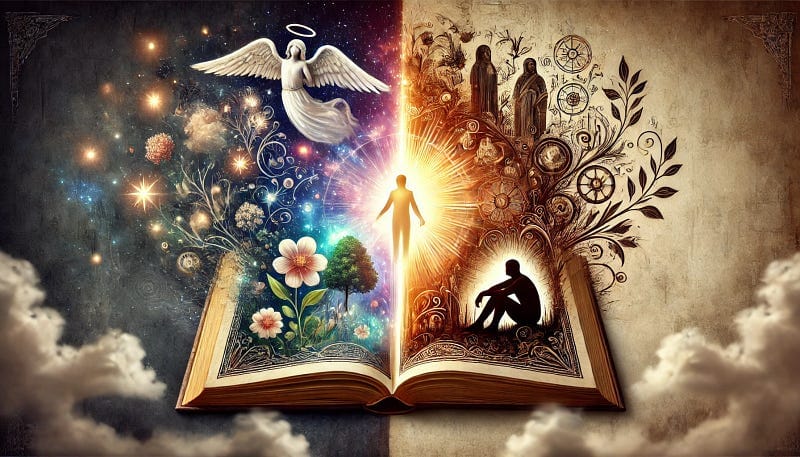The Moral Maze of Fiction: How It Affects Our Integrity.
The Role of Fiction in Shaping Our Ethical Boundaries

The role of fiction in shaping our ethical boundaries
Walter White, Wade Wilson(Deadpool), and Tyrion Lannister are a few among the many famous characters or, more particularly, anti-heroes. These characters are fan favourites and are said to influence many people in what they choose to do in their day-to-day lives. But these are just one facet of the example. Each notable character in the history of stories had a huge following and could influence the masses at a fundamental level. The “How” of this influence is pretty straightforward.
The issue is what readers grasp from these characters. Most often, we fail to grasp the entire complexity of these characters, which could possibly promote morally ambiguous traits among us. But we can never know the extent to which this can change us. So, when I encountered this dilemma, my curiosity meter again sent me alerts. And I ultimately started digging into this. And now, it’s once again the time to share my findings with you.
A Common Start
Before we go too deep, let’s start logically and try to guess how a character can influence us. Let’s start with the most common scenario in anime: discrimination. We see a character being discriminated against and shunned by everyone he knows for unknown reasons. We see him painfully looking at his peers with families celebrating their days while he is silently watching them on a swing. This entire scenario paints a picture of loneliness, which others feel sorry about.

Once the picture is embedded into their subconscious, they actively try not to discriminate against others and are mostly open to interacting with people. A different story presents a different conflict and issues; ultimately, we learn not to treat others the same as the characters we see.
What Happened Here?
Well, we learned, at least from a third-person perspective, how painful loneliness can be and made an active effort to assure our close ones from feeling the same. Similarly, different characters and different scenarios can affect people differently. I’m pretty sure everyone can agree with this common-sense result. So, what’s the problem then? Why is there a discussion on this?
Do We Only Grasp the Good Traits?
The main issue here is that I spoke only about a single character and described his state to you. What happens if there is no narrator and you interact with the story directly? There’s a huge chance that you might entirely miss the character and his backdrop. The simplest example would be Tyrion Lannister. I spoke about him because he is my favourite of the series. However, for some, it’s Varys because of his mystery and intellect, Jaimie Lannister because of his redemption arc, or Arya or Sansa Stark. Everything is fine. But the problem is the rare set of people whose favourite character is Joffrey. We can’t negate the possibility that some rare kid could come across Joffrey’s character and take him as an inspiration.
I understand that Joffrey is not a good example. So, I’ll give you one better example: Fang Yuan from Reverend Insanity. This character might be unfamiliar to most Western readers, but he is the main character of the Chinese web novel. He is surprisingly popular for his actions. He is apathetic and goes to any lengths to achieve what he wants. The world is fascinating, and Fang Yuan is a refreshing protagonist compared to other template ones. However, Fang Yuan’s lifestyle is obviously not how one should live in real life.

Fang Yuan has no sense of morality, yet he is also extremely clever in his actions. Not many of those who read are capable of that cruelty and genius. And if the reader directly influences everyone, we would be in a mess right now. Yet, we are pretty sure that this is not the case. Fang Yuan does not influence most people to a great extent. In fact, many feel refreshed from the sense of disconnect this world has from reality. So, what’s the issue? Do we only inherit the good things from the books? How does one accurately find these answers?
Let’s dive into what the research says to better understand how fiction affects our moral compass.
The Research Enters the Discussion
The research ultimately states that every significant character can influence one’s mind. Good fiction could act as an ethical example from which one’s empathy could be enhanced. However, one should note that there is a significant argument that empathy is just a tool and could also lead to potential problems. Many master manipulators are, in fact, good empaths. So, is this still a positive effect?
The answer is yes. In addition to empathy, there is another behaviour that reading can enhance. It is called “perspective-taking”, where people often tend to place themselves in other’s shoes before making decisions. So, even if one encounters a character like Fang Yuan, there is no significant problem as long as other novels promote morally bright characters like Captain America or Spider-Man. However, significant exposure to such characters can blur one’s moral boundaries. This was proved by a few morality tests, where people were surprisingly permissible about a few morally bad activities in violence, both physical and mental.

A great example of mental violence would be the “American Psycho”. I suggest reading it or watching the movie to understand what I mean. The technical term for this is moral permissibility — where repeated exposure to morally ambiguous characters can blur the lines of right and wrong, making readers more tolerant of unethical behaviour in fiction and, in some cases, real life.
So, What Promotes This?
Now comes the more important question: Does any book erode our moral boundaries? Are adults free of this effect? Can young adults and teenagers be significantly affected by these scenarios? The rating and censor system is present for these scenarios, right?
The answer is yes: teenagers can easily be affected by what they read. However, surprisingly, it’s not the young adult fiction that promotes this moral permissibility. It was found that narrative fiction and non-fiction could significantly influence one’s moral compass. Most young-adult fiction positively affects teenagers by improving their empathic concern about others and promoting their integrity.
Once again, it’s logical that narrative non-fiction, like biographies and documentaries, can significantly influence the compass. I mean, once you read Mein Kampf, you break the image of “Hitler — the demon” and get to know “Hitler — the human”. I also briefly discussed this in my other article last week. Still, ultimately, Hitler did actions worthy of being called a monster, and so did many of the ancient emperors and recent ones like Mao Zedong and Emperor Nero. But you can now find people who actively hate the notion of Hitler being called the monster. (I’ll add the link to the Reddit discussion on this in the references section). Similar cases stem from narrative fiction like Memoirs, sci-fi, fairy tales and other fantasy novels.
Is This Everything?
Well, that’s the problem. The research on this is ongoing, and there are significant questions on how the data for this research is acquired. Some also argue that the classic “Correlation is not Causation” applies in this field. However, to completely understand these arguments, you’d need to understand the proper data collection procedures and the analysis techniques. These are, unfortunately, out-of-scope for this article, and I’d be happy to discuss these through another article if you’d like. Well, it’s important to note that the research is still limited.
That’s about everything I’ve found on this topic. I hope this provided some value to you. I’m hooked on this field of research and would stay up-to-date with the latest findings on these questions. I’ll share once again if I find anything more interesting.
Thanks for staying till the end. Until next time — happy reading!
Follow The Story Taste for more!
References
- Started reading Mein Kampf, it’s kind of blowing my mind… — Reddit discussion on r/books.
- Does reading fiction increase empathy, or are empathic people more likely to read fiction? — Reddit discussion on r/askscience
- List of fictional anti-heroes — Wikipedia
- How does fiction reading influence empathy? An experimental investigation on the role of emotional transportation. — Bal PM, Veltkamp M. doi: 10.1371/journal.pone.0055341.
- Fiction and Morality: Investigating the Associations Between Reading Exposure, Empathy, Morality, and Moral Judgment — Black, Jessica & Barnes, Jennifer. (2020) doi: 10.1037/ppm0000281 ***
- Does believing something to be fiction allow a form of moral licencing or a ‘fictive pass’ in understanding others’ actions? — Thompson J, Teasdale B, van Emde Boas E, Budelmann F, Duncan S, Maguire L, Dunbar R. (2023) doi: 10.3389/fpsyg.2023.1159866
- Social Cognitive Theory 101 — David C. Wyld in Modern Business
*** This is the main reference for this article.


